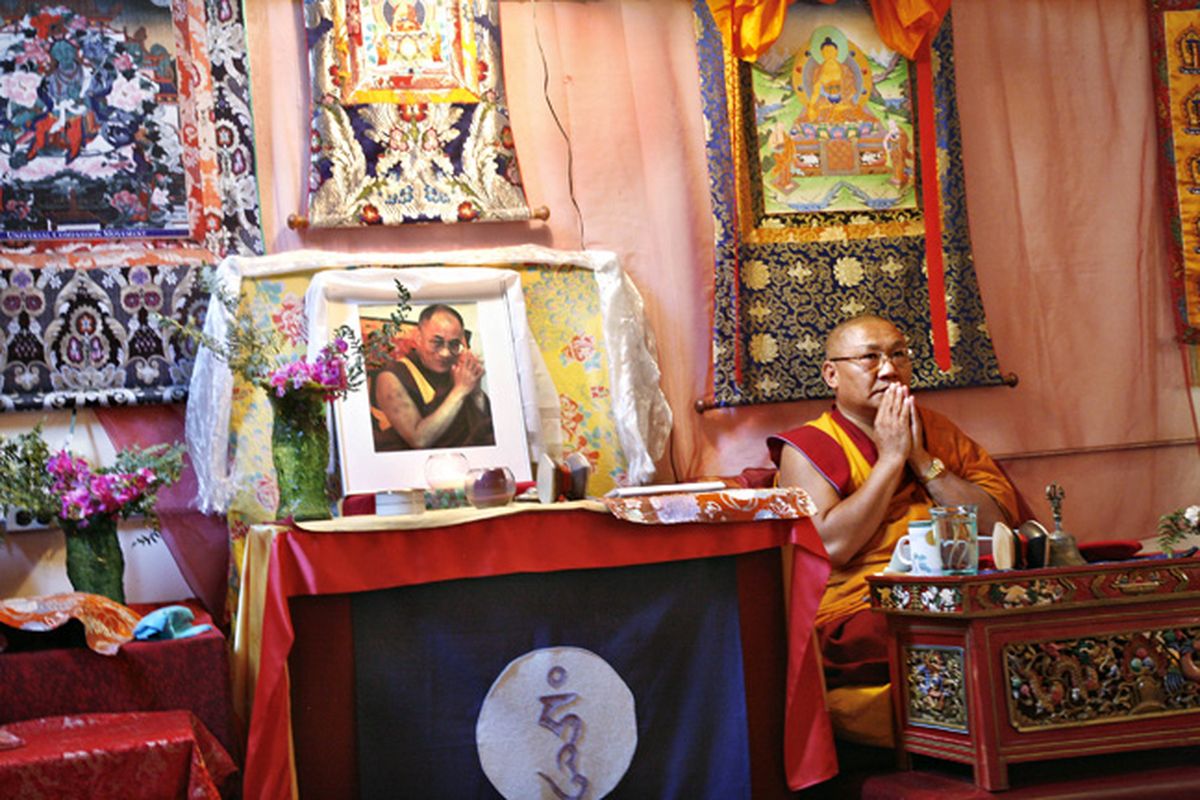One of a kind
Famed Tibetan Buddhist monk Venerable Geshe Thupten Phelgye brings his message of compassion

Do unto others.
The Golden Rule – which exists in all faiths and belief systems – asks people to place themselves in someone else’s shoes; to seek a connection with other human beings with an understanding that they, too, are struggling; and to treat others with kindness, compassion and love.
It’s a message that Venerable Geshe Thupten Phelgye tries to impart in his writings and teachings.
“A lot of people think compassion is just being nice, but it’s really more than that,” says Phelgye, a Tibetan Buddhist monk and the founder of the Universal Compassion Movement.
“From the time we wake up in the morning, we just focus on our own needs,” he says. “But a compassionate and altruistic mind asks, ‘How can I help? What can I do?’
“Instead of a self-centered ego, a compassionate mind has a true sense of the pain and suffering of others.”
Phelgye, a member of the Tibetan Parliament in Exile who lives in a monastery in southern India, is visiting the Inland Northwest to advocate for universal compassion. He will spend about two weeks in the area and will speak at various gatherings.
The world is experiencing many challenges: violence, poverty, environmental disasters and other crises, Phelgye said during a phone interview from Nevada City, Calif., the U.S. headquarters of the Universal Compassion Movement.
“In America, there are many problems, too,” he said, noting the despair that people experience as they lose their jobs, homes and other possessions.
But instead of grieving the loss of material things, happiness is possible if people focus on “our universal responsibilities,” Phelgye said, “our obligation to each other as human beings.”
In a society that promotes the self and the importance of the individual, the key to happiness is cultivating a compassionate mind and a heart that cherishes others, he said.
Known as “Geshe-la” (a term of endearment) to his students and others, Phelgye was born in Tibet in 1956 and escaped to India with his family when he was only 3 years old. Because of the Chinese invasion of Tibet, the journey took more than two years.
At age 17, Phelgye became a monk. He later earned a doctorate in Buddhist philosophy and the esteemed title “Geshe” from the Sera Monastic University in 1991.
Under the guidance of the Dalai Lama, Phelgye dedicated five years of his life to a meditation retreat in the mountains.
In 1998, with the blessing of the Dalai Lama, Phelgye established the Universal Compassion Movement, a charitable trust that seeks to “bring people together to engage in compassionate practice on behalf of unfortunate sentient beings who cannot speak of their wish and their rights to live in peace.”
Although the UCM also works to help people with disabilities and those who suffer from poverty, the organization’s main focus is to promote vegetarianism and compassion for animals.
“By becoming vegetarian, we become healthier,” said Phelgye, who made a commitment to stop eating meat after a visit to an Indian slaughterhouse in 1985. “It’s also friendlier to our ecosystems and to Mother Earth.”
In 2003, Phelgye brought a bill before other members of the Tibetan Parliament calling for vegetarianism to be more strongly encouraged among Tibetans.
In the past few years, he has been traveling throughout the world advocating for vegetarianism and universal compassion. In the United States, he has spoken at numerous Buddhist centers and several schools including Harvard University, Wheaton College, Naropa University, North Idaho College, University of Idaho and Gonzaga University.
He also participates in interfaith dialogues and works as the Tibetan Buddhist ambassador to the Sulha Peace Project in the Middle East.
Phelgye’s current visit to Spokane – his sixth in the last few years – was made possible by several organizations and individuals including the Interfaith Council, Sravasti Abbey and Lori Lindman, who represents the Spokane chapter of the Universal Compassion Movement.
“He touched my heart deeply,” said Lindman, who met Phelgye in October 2007 when the monk spoke at a gathering in Coeur d’Alene. “Whenever he speaks, he communicates love and compassion. He has definitely inspired my own spiritual path.”
Phelgye also hopes to talk to people about the struggles in his native Tibet, which has been under Chinese rule since 1951. Last year, shortly before the Olympics in Beijing, deadly riots erupted in Tibet after peaceful demonstrations quickly evolved into the largest anti-government protests that the country had experienced in nearly 20 years.
“It’s really painful,” said Phelgye. Since last year’s events, he said, “times have become even tougher for the Tibetans. … I want to express my gratitude to the government of America for their support of justice and human rights for Tibetans.”
On every topic – from politics in Tibet to the core of Buddhist teachings – Phelgye always speaks with humility, expertise and inspiration, said Tracy Morgan, a volunteer with the Spokane Dharma Friends.
“He is a monk, a politician and a refugee so a lot of people are interested in what he has to say,” Morgan said.
“He is also one of the happiest people I have ever met. He has a deep concern for others and has this aura of peace and compassion.”